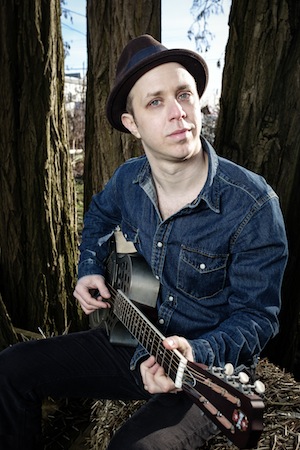Gabriel Paquin-Buki, far right, founded the band Oktopus, which started performing in 2010. (photo by Rémi Hermoso)
Among the Jewish performers at this year’s Mission Folk Music Festival, July 26-28 at Fraser River Heritage Park, are Vancouver’s Jesse Waldman and Montreal’s Gabriel Paquin-Buki. For both musicians, family has been a key inspiration.
Waldman is a guitarist, singer-songwriter, studio producer, sound designer, and film and TV composer. Originally from Thornhill, Ont., just north of Toronto, his bio describes a cassette of his grandmother singing the Yiddish folk song Papirosen to his mother as one of his “most cherished possessions.”
“That recording was from the late ’50s, most likely 1957,” Waldman told the Independent. “My family had one of the first consumer-level tape recorders, they also had one of the first eight-millimetre film cameras, too. They always loved documenting the family, taking time capsule-like snapshots to cherish and enjoy later on in life.
“The recording of that particular song – which is about a young girl selling cigarettes on a street corner – has a beautifully haunting melody. I believe my grandmother learned it from her mother, my great-grandmother. At some point, it was transferred onto a stereo cassette recorder and a few copies were made. The same tape also contains interviews with my mother, a toddler at the time, and other family members, since passed away.”
A guitar he found in his parents’ basement also played a part in the start of his musical career.
“The guitar was an old beat-up nylon-string classical guitar that belonged to my Aunt Sherri,” said Waldman. “Actually, I suspect it belonged to one of her ex-boyfriends. I figured out how to play ‘Smoke on the Water’ on one string and was hooked for life! That was back in 1989.”
Waldman made his way to Vancouver in 1995 “on a whim,” he said. “I wanted to go somewhere where no one knew me and reinvent myself. From the moment I saw the mountains and smelled the ocean, I instantly felt at home. Then, after meeting the people and getting a feel for the laidback vibe of the West Coast, I was sold on Vancouver.”
For Paquin-Buki, whose group Oktopus began performing in 2010, it was his father who introduced him to klezmer.
“My father was born into a Polish Jewish family and has carried klezmer music with him all his life. His transmission to me of this cultural legacy occurred quite naturally. The cassettes he would play in the family car, the klezmer recordings during parties at our home, the live bands at family weddings and those rare times he would play songs on the piano were enough for me to access the roots of this musical tradition,” said Paquin-Buki.
“As it is for many children, I believe it was the rhythm of this music that excited me. The recordings we listened to were mostly of fast songs and, for me, were synonymous with joy. My love for this music today has so many facets! When we listen to klezmer, we can somehow feel the richness of the Jewish people’s millennial history and hear their encounters with musicians from all over the planet and across centuries. Also, major-minor ambivalence in the main klezmer scale (the freygish) embodies the dichotomy between laughter and tears so characteristic of Jewish culture. And it’s always fun music to play.”
Waldman has similar views. “I’ve always enjoyed klezmer music,” he said. “The mile-a-minute dance numbers, the sorrowful ballads and the cheeky vocals. Many klezmer compositions use melodies based on the harmonic minor scale, which includes a minor third and a major seven, which makes it sound particularly haunting and mournful to me. In terms of culture, all of my band mates in my early days were Jewish. I definitely cut my teeth with fellow Jews who know the delights of Shabbos dinner and a good bagel with lox and cream cheese!”

While he enjoys klezmer, Waldman’s music is predominantly folk and blues. “I love the sound, the rawness and heavy emotional weight of those styles,” he explained. “I also love the storytelling aspect of it, specific life experiences, places and relationships. Real folk and blues is unique to each artist but also has a tradition of carrying classic songs through the generations. I also love how blues has a way of transforming deep pain into something beautiful.”
Waldman’s debut album, Mansion Full of Ghosts, which was released in 2017, is described as “an exploration of the city’s vast duality, a backdrop of beauty mirrored by a fierce underbelly and a need to keep a light on in the dark.” It includes songs about his neighbourhood, the Downtown Eastside, and, in talking about what drives him to make socially conscious music, he said, “I think mostly my compassion for other people, particularly those less fortunate than myself. I also yearn to connect with people on a deeper level and music and honest lyrics are a good way to achieve that.”
Among the talent featured on that album is his partner, Megan Alford. Currently, the two are working on a recording of her music, Field Guide to Wildflowers, scheduled for an early 2020 release. “My role is producer and guitar player,” said Waldman. “She is an outstanding songwriter with a great voice and poignant and deeply personal lyrics. We’ve been working together for a couple years now and the songs have really come to life.”
As can blues music, klezmer holds space for both happiness and sadness. In addition to being a musician, Paquin-Buki holds a master’s degree in comparative literature. In his first semester, he took two courses that focused on literature from the concentration camps. Le Verfügbar aux enfers (The Lowest-Class Worker Goes to Hell), written by Germaine Tillion, a prisoner at Ravensbrück, particularly caught his attention. “This work has a substantial musical dimension and contains a lot of humour…. I was very keen on exploring this taboo subject of laughter and the Holocaust and especially on trying to understand what its benefits were and what shapes it could subsequently take…. For the time being, there is no direct connection between this topic and Oktopus’s music but, in performance, it allows me to flesh out historical intros between pieces. It also adds a new dimension to these tears that are halfway between laughter and sorrow, since klezmer music – and particularly the clarinet – reproduces vocal inflections that convey laughter and sorrow.
“I would very much like to compose a piece based on one of the works I used in my thesis, ‘La danse de Gengis Cohn.’ I also have a mind to add a work from KZ Muzik, a vast box set recording that traces and publishes many works composed in concentration camps. But, overall, the fact remains that my own academic project on such a profound and terrifying topic has changed my general view of the world and impacts everything I do.”

Paquin-Buki is the driving force behind Oktopus’s mission to perpetuate klezmer. “By striving to perpetuate this musical tradition, I am keeping the culture of my ancestors alive and this is of special significance to me,” he said. “Nevertheless, since klezmer carries universal values, our approach also makes substantial room for the musical traditions of Quebec.”
Indeed, Oktopus combines elements of different cultures.
“The klezmer repertoire is so vast that we cannot possibly cover it all in our lifetimes,” said Paquin-Buki. “But we have also chosen to incorporate classical melodies – we are all classically trained and so we necessarily view klezmer through the lens of classical music, in the way our ears have been trained to hear it – as well as Quebec chansons [folk songs] and, sometimes, songs from other cultures around the world.
“Trying to somehow recreate these songs as they were played decades or even centuries ago is not really in line with our view of tradition, which is not a static concept for us. Tradition is something that evolves and so, in certain respects, we try to imagine what the klezmorim repertoire might have been like if they had settled in Montreal. They would have necessarily incorporated Québécois and Canadian songs and styles. Historically, klezmer absorbs the different cultures it encounters along its way, while staying true to its deep roots, which colour everything it touches. The important thing is to remain connected to those roots.”
One challenge in maintaining that connection for Paquin-Buki has been that his “classical training got in the way in some respects because klezmer is largely an oral tradition.” He couldn’t find any scores for a klezmer ensemble and, he said, “In the environment in which I functioned as a musician, nothing was possible without written-down notes. But, to make a long story short, I finally decided to write out the arrangements myself. They turned out very badly at the beginning, but with help and a lot of work, they evolved into something presentable.
“The group’s configuration,” he said of Oktopus, “is loosely based on what I heard on recordings of the Klezmer Conservatory Band: clarinet, violin, flute, trombone, tuba (now bass trombone), piano and drums. Back in 2009, I was not acquainted with that many musicians, so I recruited a few friends and other promising students from the faculty of music. The group began playing in 2010 – three pieces performed in a chamber music concert at the Université de Montréal. The following year, we were offered our first professional engagements.” Oktopus has two albums – Lever l’encre (2014) and Hapax (2017) – both of which were nominated for Juno and Canadian Folk Music awards.
Local Jewish community member Geoff Berner (jewishindependent.ca/songs-of-justice-and-of-hope and jewishindependent.ca/songs-with-meaning) is also on the Mission Folk Music Festival lineup this year. For more on the festival, visit missionfolkmusicfestival.ca.

